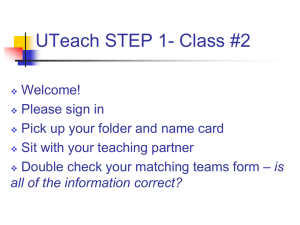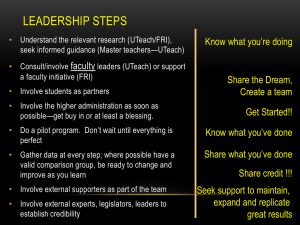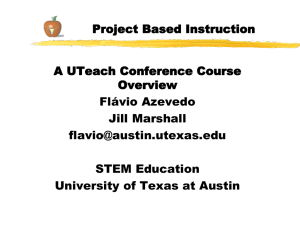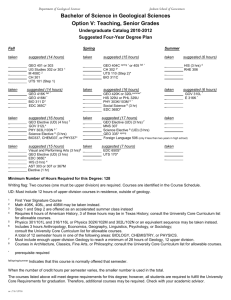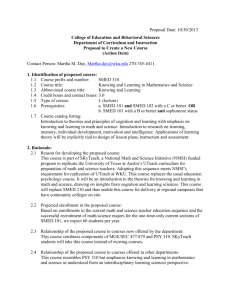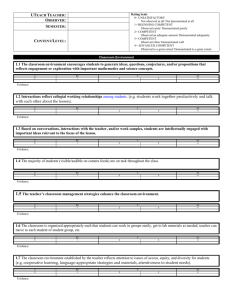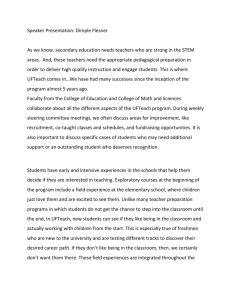Michael Marder
advertisement
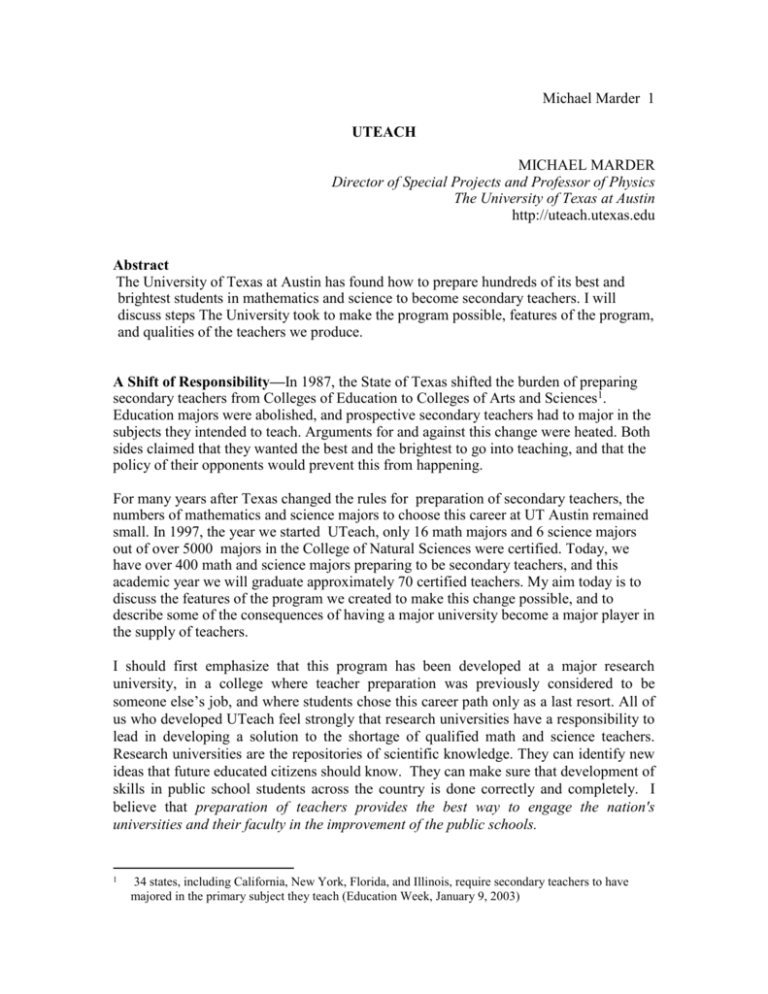
Michael Marder 1 UTEACH MICHAEL MARDER Director of Special Projects and Professor of Physics The University of Texas at Austin http://uteach.utexas.edu Abstract The University of Texas at Austin has found how to prepare hundreds of its best and brightest students in mathematics and science to become secondary teachers. I will discuss steps The University took to make the program possible, features of the program, and qualities of the teachers we produce. A Shift of Responsibility—In 1987, the State of Texas shifted the burden of preparing secondary teachers from Colleges of Education to Colleges of Arts and Sciences1. Education majors were abolished, and prospective secondary teachers had to major in the subjects they intended to teach. Arguments for and against this change were heated. Both sides claimed that they wanted the best and the brightest to go into teaching, and that the policy of their opponents would prevent this from happening. For many years after Texas changed the rules for preparation of secondary teachers, the numbers of mathematics and science majors to choose this career at UT Austin remained small. In 1997, the year we started UTeach, only 16 math majors and 6 science majors out of over 5000 majors in the College of Natural Sciences were certified. Today, we have over 400 math and science majors preparing to be secondary teachers, and this academic year we will graduate approximately 70 certified teachers. My aim today is to discuss the features of the program we created to make this change possible, and to describe some of the consequences of having a major university become a major player in the supply of teachers. I should first emphasize that this program has been developed at a major research university, in a college where teacher preparation was previously considered to be someone else’s job, and where students chose this career path only as a last resort. All of us who developed UTeach feel strongly that research universities have a responsibility to lead in developing a solution to the shortage of qualified math and science teachers. Research universities are the repositories of scientific knowledge. They can identify new ideas that future educated citizens should know. They can make sure that development of skills in public school students across the country is done correctly and completely. I believe that preparation of teachers provides the best way to engage the nation's universities and their faculty in the improvement of the public schools. 1 34 states, including California, New York, Florida, and Illinois, require secondary teachers to have majored in the primary subject they teach (Education Week, January 9, 2003) Michael Marder 2 Elements of Success— The single most important factor in the development of UTeach was the decision that teacher preparation would assume the level of importance, and receive the level of internal funding, typically associated with research initiatives. The President of the University, Larry Faulkner, and Provost of the University, Sheldon Ekland-Olson provided crucial support. I also must single out the Dean of Natural Sciences, Mary Ann Rankin who initiated UTeach, and the Dean of Education, Manuel Justiz, who put the full support of his College behind it shortly after inception. UTeach was initially designed by a team of Master Teachers -- award-winning secondary teachers brought to the College of Natural Sciences as consultants to outline the teacher preparation program they wished they could have had. We now employ seven master teachers within the College of Natural Sciences full-time to teach and support teacher preparation courses. One of the most important elements of UTeach success is early field experience. The entire College of Natural Sciences freshman class is invited to explore the possibility of teaching by taking two initial UTeach courses. Students who accept this invitation begin classroom teaching in Austin elementary schools almost immediately. They are carefully supervised by exemplary classroom teachers who agree to coach them. Next, we take students into middle school classrooms, again under careful guidance. Private gift funds pay the tuition for these two courses and provide a stipend to the hundreds of supervising classroom teachers. The opportunity to try public school teaching at no cost, and the positive experiences our students have when they try it, are major factors in the rapid growth of the program. The best way to convince talented young people to teach is to give them a successful opportunity to teach. UTeach offers students many benefits. They are eligible for numerous scholarships. They can earn money and develop their skills through community outreach, mentoring, and informal science teaching. Many students report that these experiences, again supported by gift funds, also strongly influence their decision to teach. UTeach has been developed in close partnership with professors in the College of Education, and UTeach students take several courses from them. The education courses have been completely redesigned to focus upon the special demands of secondary science and mathematics teaching. UTeach features a technology-rich curriculum that emphasizes the use of new educational tools in instruction, and special courses on research and on inquiry skills that we hope can help transfer the thrill of new discovery to the public school classroom. Simultaneously, we have succeeded in creating compact degree plans that allow almost all students to graduate in four years having completed both their content courses and the requirements for teacher certification. Obtaining teacher certification through UTeach does not cost our undergraduates any extra money, and in most cases it takes them no extra time. Growth and success of the program—Students at UT Austin have responded Michael Marder 3 enthusiastically to the creation of UTeach, and the program has grown rapidly. From a pilot project with 28 students in the fall of 1997 it has now matured to a high-profile, well-respected program with an enrollment of more than 450. Over 300 students will have graduated by the end of spring 2006. Over 80% of UTeach graduates who began teaching Fall 2001 or before are still in the classroom. This year, over 70 new teachers will graduate. The quality of UTeach students is very high. As a group they have high SAT scores, and higher-than-average grades in comparison to their College of Natural Sciences undergraduate peer group. Approximately one-third of UTeach students are traditionally underrepresented minorities—twice as many as in the overall UT undergraduate population. Students and faculty alike are proud of the program and the positive attention it has received. Although UTeach is very young, many of our graduates have already won awards, been named department chairs, or been charged with developing challenging new courses. Beyond its ability to attract top students into math and science education, the success of UTeach can be measured in its increasing stature as a model program for teacher preparation in which colleges of arts and sciences and colleges of education work together with public schools. On our own campus, the College of Liberal Arts has implemented its own version of UTeach, now entering its fourth year. Texas A&M has implemented a program similar to UTeach after several discussions with us. UT San Antonio has a UTeach program. Many other Texas institutions as well as institutions in Louisiana and Colorado are exploring ways to create similar initiatives. California loosely based California Teach on our ideas. The UT System has declared UTeach to be a part of the Every Child Every Advantage initiative2, and the National Research Council has cited us as a model program in several reports, including the Gathering Storm3. We believe the UTeach model has tremendous potential to reverse the shortage of quality teachers. New Challenges—Four years ago Texas changed the structure of teaching certification to three categories, PK-4, 4-8, and 8-12. UTeach now finds itself responsible for the preparation of teachers in grades 4-12. We welcome this change because we believe that strong science and math in the primary and middle grades is essential for later success. Another critical concern of UTeach is support for our graduates and other novice science and math teachers. The first years are critical for new teachers; more than 30% of Texas math and science teachers leave the profession within their first three years of service. By five years that number has climbed to 40%. In fact, there are few areas with a real shortage of certified teachers; there is a shortage of certified teachers willing to teach. 2 http://www.utsystem.edu/EveryChild/K16PrgDes-Initiative1.html Educating Teachers of Science, Mathematics, and Technology: New Practices for the New Millennium, National Academy of Sciences Press, (2000);Rising Above the Gathering Storm: Energizing and Employing America for a Brighter Economic Future, National Academy of Sciences Press (2005) 3 Michael Marder 4 Thus, no matter how successful we are at inducing students to enter the teaching profession, until we find ways to support them once they begin teaching professionally, we are not going to make much progress in solving the teacher shortage. Two years ago we inaugurated a regional support center for new mathematics and science teachers in the Central Texas region. It provides skilled professional mentors to travel to new teachers' classrooms whenever needed. Simultaneously, we started a new Master's degree option, offered in summers, for experienced teachers ready to come back to school to enhance their content and teaching knowledge. We have active cohorts in Biology, Chemistry, Physics, and three cohorts in Mathematics. The close involvement of our College of Science in these activities would have been very difficult without the experience we gained through preparing teachers. Funding Challenges and Goals—Core funding for UTeach faculty salaries and course development has been provided by the Colleges of Natural Sciences and Education—a current investment from The University of Texas of over $1,000,000 per year. However, many of the special features of the program that have made it a success cannot be funded from state appropriations. Grants from several Texas foundations have enabled us to pay tuition for the initial courses, to pay master and mentor teachers, to support student internships, and to purchase essential equipment, kits and software for use in public school classrooms. We have also received National Science Foundation support. But seed funding cannot sustain the program indefinitely. We are working to raise a $15 million endowment whose earnings will support UTeach for the long term. We are more than half way to meeting this goal, and it remains a high priority. Institutions interested in replicating UTeach need to be aware of these funding issues. Summary— Thus, some of the main lessons we have learned through UTeach are 1. Substantial numbers of the nation's best students are willing to become teachers. 2. Recruiting these students into the teaching profession requires a shift in attitude from the nation's universities, so that preparation of teachers is viewed as one of the highest missions of every college and every department, and resources comparable to those given to traditional departments are available to support prospective teachers. 3. Universities that learn to prepare teachers well will also be in a position to provide many additional forms of support to the public schools. Helping great teachers stay in the profession is just as significant as helping new ones enter. 4. However, success requires effort and time, and some of the resources needed for State universities fully to support teachers can only be obtained through foundation or gift funding. Appendix: Essential Elements of UTeach For those interested in replicating UTeach, the following list of items that have been essential to its success may be helpful. Items that are both most critical and most difficult to achieve are at the top. Michael Marder 5 (a) UTeach is a joint effort of the Colleges of Education and Natural Sciences; faculty and staff in both colleges meet regularly and develop consensus on instructional and policy decisions. (b) UTeach employs Master Teachers on the instructional budget to supervise field experiences and teach certain associated classes. A Master Teacher is an individual with at least 3 years public school teaching experience who has put into practice the instructional strategies on which we will be evaluating UTeach students. Master Teachers are tremendous examples and guides, they are knowledgeable about what new teachers really face and need, and they are indispensable in providing connections with local school district teachers and administrators (c) Instructors, Master Teachers, and staff adequate to support the students, cooperating teachers, program administrators, and space and equipment needed for the UTeach instructional program are paid from the recurring university budget. (d) UTeach students have access to excellent advising staff to help them navigate their complex degree requirements (e) Essential program elements that cannot be supported from customary instructional funds are supported from gift and foundation funds, which provide UTeach students access to a wide range of student financial support. UTeach reimburses students for the tuition associated with the first two one-hour courses, offers paid internships with nonprofit educational organizations to all students who must work, and provides an array of scholarships. (f) In their first program semester, UTeach students have carefully supervised field experiences in public school classrooms using research-based instructional materials that give them successful but realistic teaching experiences, and let them begin to judge if teaching is a suitable profession. (g) Field experiences continue throughout the program and are supervised by the Master Teachers, with an emphasis upon quality and opportunities for reflection rather than sheer numbers of hours of classroom time. Every student receives detailed written commentary on his or her teaching from cooperating teachers, and whenever possible from course instructors and Master Teachers. Lessons may be video-taped to provide opportunities for further analysis and reflection. (h) UTeach degree plans are available for all teaching certifications involving science, mathematics, and computer science in grades 4-12, and all UTeach degree plans can realistically be completed by a student in four years. (i) UTeach has provisions for post-baccalaureate admission, flexible program entry, and provides in some cases for program completion in one year. (j) All students in the College of Natural Sciences are recruited to join UTeach; they receive a letter about it upon admission, hear about it during orientation, and receive additional invitations during mailings each year, from presentations before students groups, and from newspaper and television reports. (k) All courses in the UTeach professional development sequence are specifically designed for the needs of future secondary teachers of science, mathematics, and computer science. There are no generic education classes. Michael Marder 6 (l) All courses in the UTeach professional development sequence are taught by specialists with current knowledge of research into how people learn, assessment, instructional methods, and pedagogical content knowledge. (m) UTeach degree plans are constructed with attention to state and national standards for teacher preparation in each discipline, including both process skills and content items. All the competencies of teachers required by the State, and assessed by the portfolio and final observation are covered during the UTeach course sequence. (n) UTeach gathers regular data on students’ progress toward teaching competencies and on their attitudes towards the preparation they receive (o) UTeach provides its graduates mentoring and help after graduation through continued personal contacts, online support systems, periodic workshops back at the university, and the opportunity to obtain advanced degrees. (p) All cooperating public school teachers mentoring UTeach students are paid for their efforts and receive appropriate professional development. (q) Instruction in UTeach courses models teaching practices expected of its graduates to the extent possible in a university setting. (r) All students in UTeach are subject to a final evaluation of their teaching proficiency that is based on their classroom performance and involves multiple trained observers. (s) All lessons taught by UTeach students in the field are based upon carefully prepared lesson plans in 5-E format or other uniform format that are available for review by course instructors, Master Teachers, and cooperating teachers prior to delivery. (t) All UTeach students complete a portfolio, a final document of their accomplishments according to the State standards and additional UTeach program requirements. (u) UTeach students acquire experience with instructional technology through experiences woven throughout the UTeach courses. (v) UTeach courses emphasize the use of inquiry as a means to engage students in learning mathematics and science. (w) UTeach courses emphasize the connections between the sciences and between mathematics and the sciences. (x) All UTeach students have a research experience to expose them to the balance of open inquiry and technical accomplishment that characterizes investigations in science and mathematics. (y) All UTeach students receive instruction on the history and philosophy of mathematics and science. (z) Students have a voice in UTeach through a student organization.
